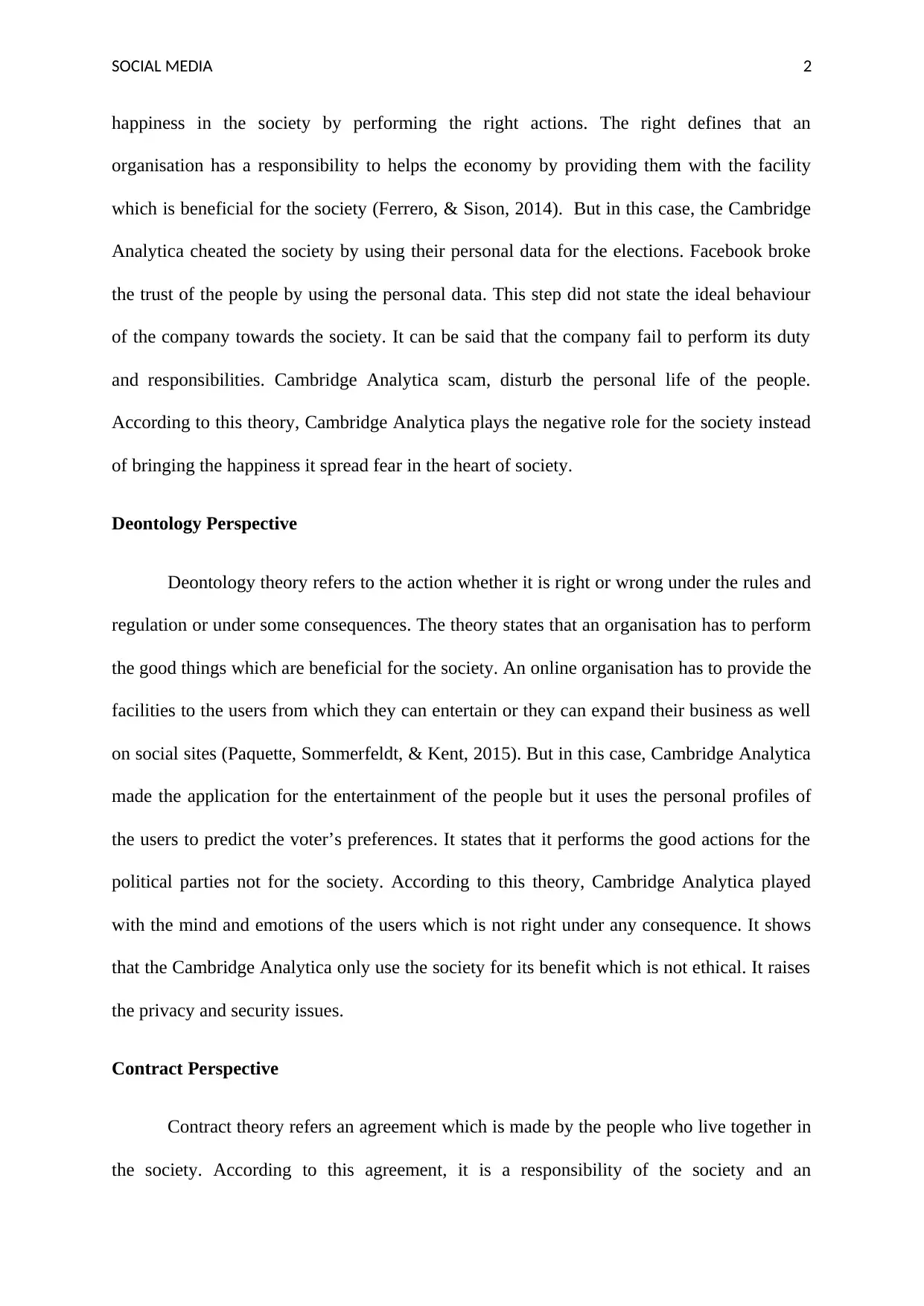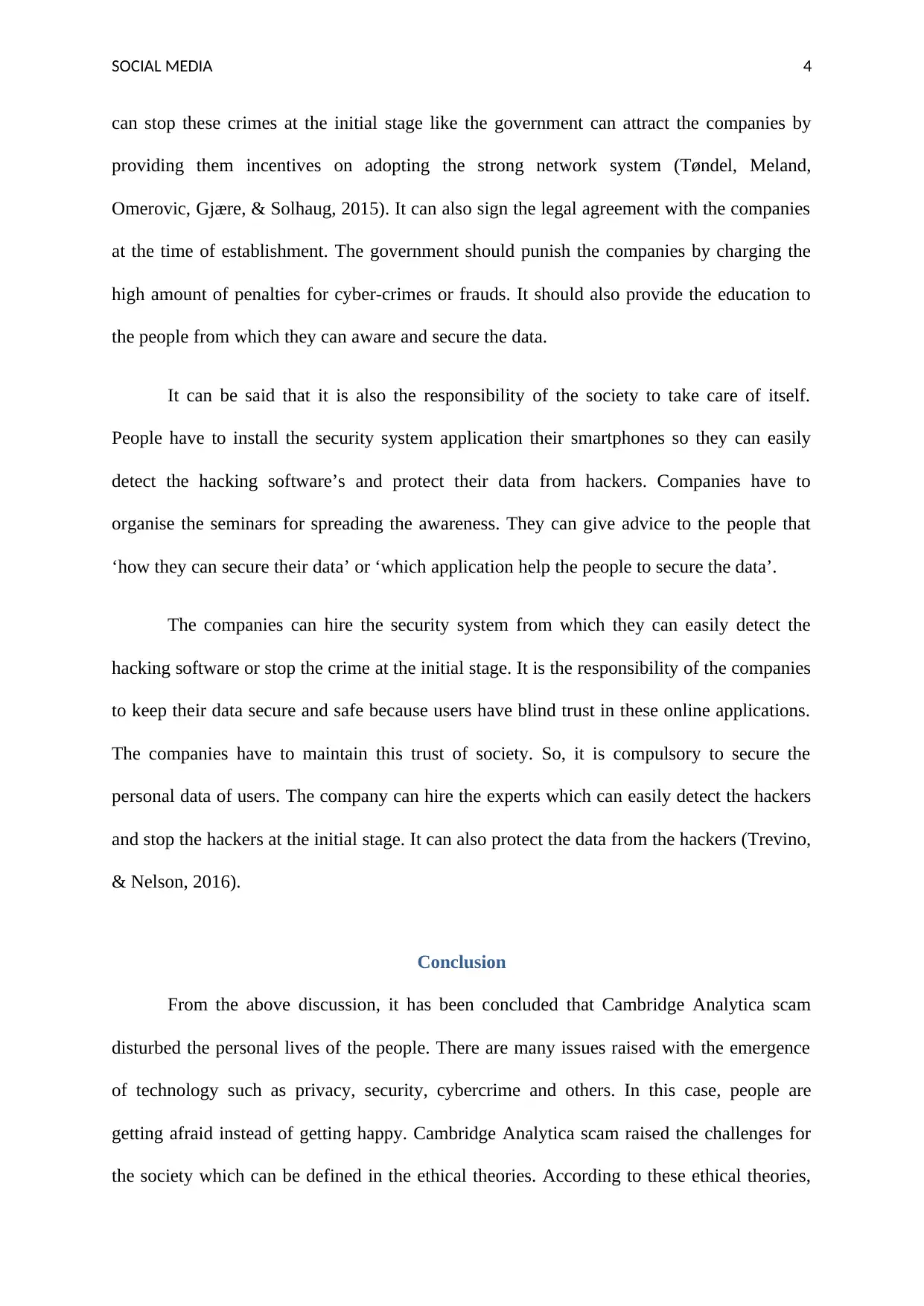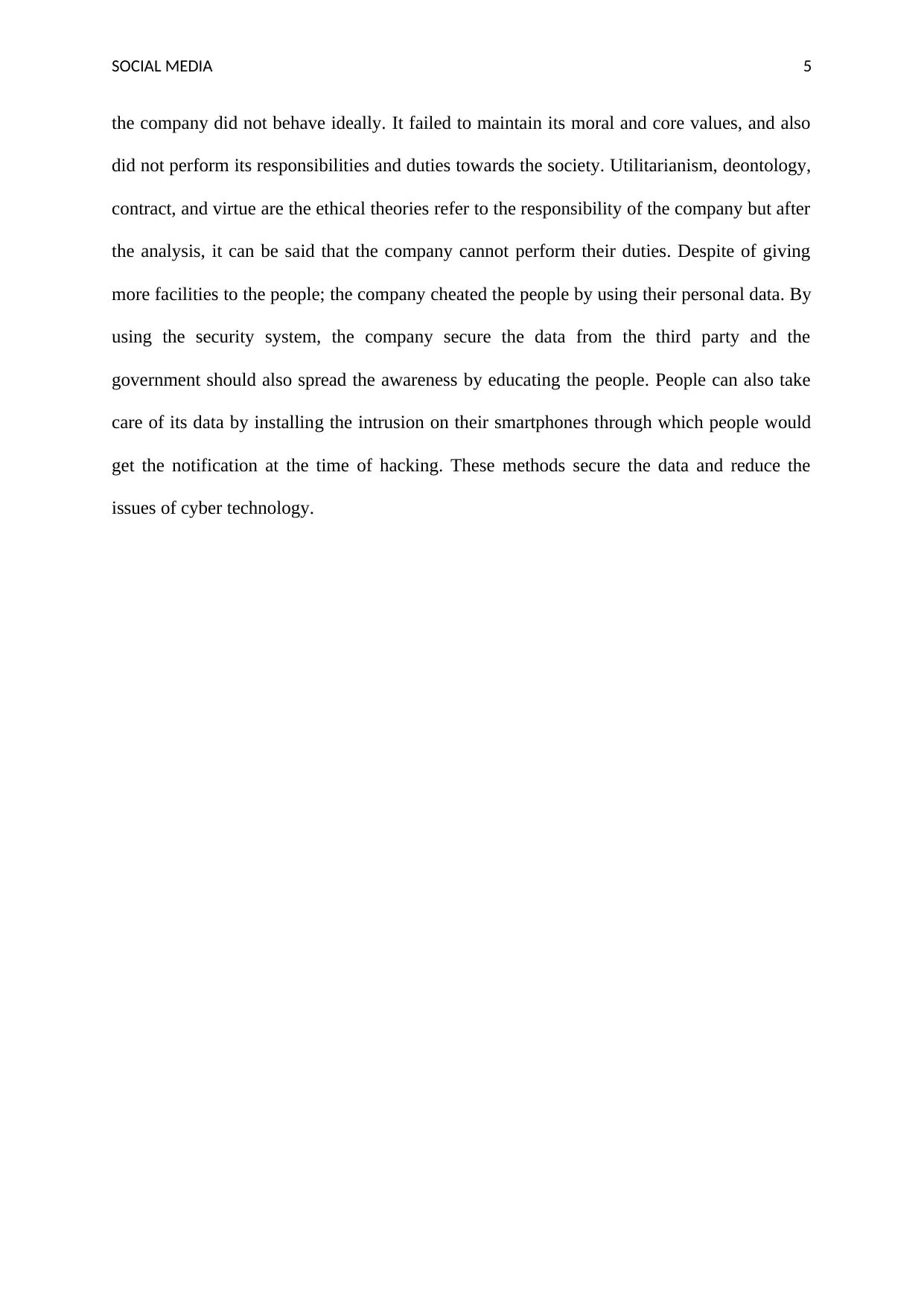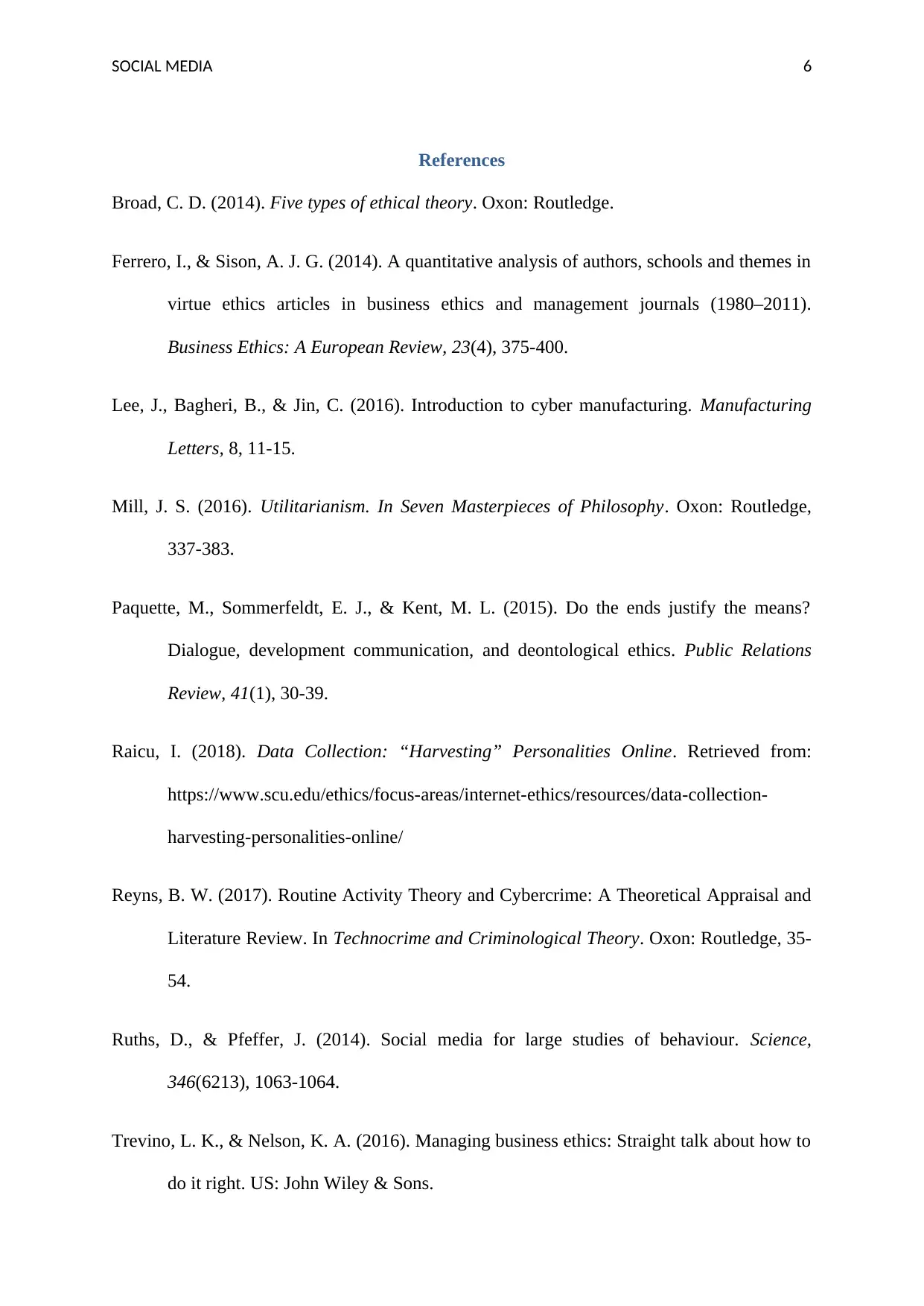Analyzing Cambridge Analytica: Applying Ethical Theories and Impact
VerifiedAdded on 2023/06/07
|8
|1880
|485
Essay
AI Summary
This essay provides an in-depth analysis of the Cambridge Analytica scandal through the lens of four classical ethical theories: virtue ethics, deontology, contract theory, and utilitarianism. It examines how Cambridge Analytica's actions, particularly the misuse of Facebook users' personal data for political purposes, violate the principles of each theory. The essay argues that the company failed to uphold its ethical responsibilities, prioritizing profit and political gain over the well-being and privacy of individuals. Furthermore, it suggests recommendations for preventing similar ethical breaches in the future, including stricter government regulations, increased corporate transparency, and enhanced public awareness of data privacy issues. The conclusion reinforces the importance of ethical conduct in the digital age and calls for a greater commitment to protecting individuals' rights and promoting social welfare.

SOCIAL MEDIA
Paraphrase This Document
Need a fresh take? Get an instant paraphrase of this document with our AI Paraphraser

SOCIAL MEDIA 1
Data Collection: “Harvesting” Personalities Online
Introduction
Technology changes the things and provides the ability to communicate with people.
Online communication is more effective than using the telephones or post offices for the
communication due to its speed (Lee, Bagheri, & Jin, 2016). People can communicate easily
with the help of social sites; instant messenger getting more popular in the present days.
Social media is providing the platform to the people to talk with friends and families that are
far away from them. It also provides the platform to the businesses and big organisation to
exchange their ideas and information with millions of people (Ruths, & Pfeffer, 2014). The
companies use the social media for advertisement or to attract the consumers towards their
brands and services. Social media reached the entire business segment which increases the
issues due to emerging the computers and technology. There are many ethical issues raise
from the technology when it used in large amount. The companies start operating the
business on social media, which increase the issues like in the case of Cambridge Analytica,
the company used the personal data of Facebook users (Raicu, 2018). Facebook leaked the
personal data of the users. In this paper, the discussion will be made on the Cambridge
Analytica scandal. In this report, the Cambridge Analytica case study is discussed by
applying the ethical theories.
Ethical theories
Virtue perspective
Virtue theory defines the character which performs the right action to bring the
happiness in the society. According to this theory, an organisation has a duty to bring the
Data Collection: “Harvesting” Personalities Online
Introduction
Technology changes the things and provides the ability to communicate with people.
Online communication is more effective than using the telephones or post offices for the
communication due to its speed (Lee, Bagheri, & Jin, 2016). People can communicate easily
with the help of social sites; instant messenger getting more popular in the present days.
Social media is providing the platform to the people to talk with friends and families that are
far away from them. It also provides the platform to the businesses and big organisation to
exchange their ideas and information with millions of people (Ruths, & Pfeffer, 2014). The
companies use the social media for advertisement or to attract the consumers towards their
brands and services. Social media reached the entire business segment which increases the
issues due to emerging the computers and technology. There are many ethical issues raise
from the technology when it used in large amount. The companies start operating the
business on social media, which increase the issues like in the case of Cambridge Analytica,
the company used the personal data of Facebook users (Raicu, 2018). Facebook leaked the
personal data of the users. In this paper, the discussion will be made on the Cambridge
Analytica scandal. In this report, the Cambridge Analytica case study is discussed by
applying the ethical theories.
Ethical theories
Virtue perspective
Virtue theory defines the character which performs the right action to bring the
happiness in the society. According to this theory, an organisation has a duty to bring the

SOCIAL MEDIA 2
happiness in the society by performing the right actions. The right defines that an
organisation has a responsibility to helps the economy by providing them with the facility
which is beneficial for the society (Ferrero, & Sison, 2014). But in this case, the Cambridge
Analytica cheated the society by using their personal data for the elections. Facebook broke
the trust of the people by using the personal data. This step did not state the ideal behaviour
of the company towards the society. It can be said that the company fail to perform its duty
and responsibilities. Cambridge Analytica scam, disturb the personal life of the people.
According to this theory, Cambridge Analytica plays the negative role for the society instead
of bringing the happiness it spread fear in the heart of society.
Deontology Perspective
Deontology theory refers to the action whether it is right or wrong under the rules and
regulation or under some consequences. The theory states that an organisation has to perform
the good things which are beneficial for the society. An online organisation has to provide the
facilities to the users from which they can entertain or they can expand their business as well
on social sites (Paquette, Sommerfeldt, & Kent, 2015). But in this case, Cambridge Analytica
made the application for the entertainment of the people but it uses the personal profiles of
the users to predict the voter’s preferences. It states that it performs the good actions for the
political parties not for the society. According to this theory, Cambridge Analytica played
with the mind and emotions of the users which is not right under any consequence. It shows
that the Cambridge Analytica only use the society for its benefit which is not ethical. It raises
the privacy and security issues.
Contract Perspective
Contract theory refers an agreement which is made by the people who live together in
the society. According to this agreement, it is a responsibility of the society and an
happiness in the society by performing the right actions. The right defines that an
organisation has a responsibility to helps the economy by providing them with the facility
which is beneficial for the society (Ferrero, & Sison, 2014). But in this case, the Cambridge
Analytica cheated the society by using their personal data for the elections. Facebook broke
the trust of the people by using the personal data. This step did not state the ideal behaviour
of the company towards the society. It can be said that the company fail to perform its duty
and responsibilities. Cambridge Analytica scam, disturb the personal life of the people.
According to this theory, Cambridge Analytica plays the negative role for the society instead
of bringing the happiness it spread fear in the heart of society.
Deontology Perspective
Deontology theory refers to the action whether it is right or wrong under the rules and
regulation or under some consequences. The theory states that an organisation has to perform
the good things which are beneficial for the society. An online organisation has to provide the
facilities to the users from which they can entertain or they can expand their business as well
on social sites (Paquette, Sommerfeldt, & Kent, 2015). But in this case, Cambridge Analytica
made the application for the entertainment of the people but it uses the personal profiles of
the users to predict the voter’s preferences. It states that it performs the good actions for the
political parties not for the society. According to this theory, Cambridge Analytica played
with the mind and emotions of the users which is not right under any consequence. It shows
that the Cambridge Analytica only use the society for its benefit which is not ethical. It raises
the privacy and security issues.
Contract Perspective
Contract theory refers an agreement which is made by the people who live together in
the society. According to this agreement, it is a responsibility of the society and an
⊘ This is a preview!⊘
Do you want full access?
Subscribe today to unlock all pages.

Trusted by 1+ million students worldwide

SOCIAL MEDIA 3
organisation to gives benefit to each other. Society helps the organisation by providing them
the assets and profit thus; an organisation also has the responsibility to gives the benefit to the
society (Broad, 2014). An online organisation has the responsibility to provide the online
communication facility to the society so they can easily communicate with each other.
Despite of giving the benefits to society; the company cheated the society by using their
personal data. According to this theory, it can be said that the company cannot fulfil its
agreement and fails to perform its responsibility.
Utilitarianism Perspective
Utilitarianism theory refers to actions which produce the happiness and provide the
greatest benefit to the people. An organisation has the responsibility to provide the facilities
to the society to entertain them and for which they can share their ideas and views. Although,
Facebook provided these facilities it leaked the personal information of the users to
Cambridge Analytica which discourage the users instead of happiness (Mill, 2016). The
company use the data to help the Donald Trump in the elections. People got affected by the
services of the Facebook. According to this theory, Cambridge Analytica fails to fulfil in
bring the happiness in the society or it can be said that only Donald Trump and Cambridge
Analytica got the utility but society faced the problems. Facebook provides the facility by
made the application of the psychology test in which people log in to the application by
editing their personal data and Cambridge use this data for Donald Trump or other political
parties. From this data, Cambridge analyses the voter’s preference. It states that the company
used the emotions of the society which is not legal for the company.
Recommendations
From the above analysis, it has been recommended that the government should take
the step to stop this crime. The government should make the new rules and regulation which
organisation to gives benefit to each other. Society helps the organisation by providing them
the assets and profit thus; an organisation also has the responsibility to gives the benefit to the
society (Broad, 2014). An online organisation has the responsibility to provide the online
communication facility to the society so they can easily communicate with each other.
Despite of giving the benefits to society; the company cheated the society by using their
personal data. According to this theory, it can be said that the company cannot fulfil its
agreement and fails to perform its responsibility.
Utilitarianism Perspective
Utilitarianism theory refers to actions which produce the happiness and provide the
greatest benefit to the people. An organisation has the responsibility to provide the facilities
to the society to entertain them and for which they can share their ideas and views. Although,
Facebook provided these facilities it leaked the personal information of the users to
Cambridge Analytica which discourage the users instead of happiness (Mill, 2016). The
company use the data to help the Donald Trump in the elections. People got affected by the
services of the Facebook. According to this theory, Cambridge Analytica fails to fulfil in
bring the happiness in the society or it can be said that only Donald Trump and Cambridge
Analytica got the utility but society faced the problems. Facebook provides the facility by
made the application of the psychology test in which people log in to the application by
editing their personal data and Cambridge use this data for Donald Trump or other political
parties. From this data, Cambridge analyses the voter’s preference. It states that the company
used the emotions of the society which is not legal for the company.
Recommendations
From the above analysis, it has been recommended that the government should take
the step to stop this crime. The government should make the new rules and regulation which
Paraphrase This Document
Need a fresh take? Get an instant paraphrase of this document with our AI Paraphraser

SOCIAL MEDIA 4
can stop these crimes at the initial stage like the government can attract the companies by
providing them incentives on adopting the strong network system (Tøndel, Meland,
Omerovic, Gjære, & Solhaug, 2015). It can also sign the legal agreement with the companies
at the time of establishment. The government should punish the companies by charging the
high amount of penalties for cyber-crimes or frauds. It should also provide the education to
the people from which they can aware and secure the data.
It can be said that it is also the responsibility of the society to take care of itself.
People have to install the security system application their smartphones so they can easily
detect the hacking software’s and protect their data from hackers. Companies have to
organise the seminars for spreading the awareness. They can give advice to the people that
‘how they can secure their data’ or ‘which application help the people to secure the data’.
The companies can hire the security system from which they can easily detect the
hacking software or stop the crime at the initial stage. It is the responsibility of the companies
to keep their data secure and safe because users have blind trust in these online applications.
The companies have to maintain this trust of society. So, it is compulsory to secure the
personal data of users. The company can hire the experts which can easily detect the hackers
and stop the hackers at the initial stage. It can also protect the data from the hackers (Trevino,
& Nelson, 2016).
Conclusion
From the above discussion, it has been concluded that Cambridge Analytica scam
disturbed the personal lives of the people. There are many issues raised with the emergence
of technology such as privacy, security, cybercrime and others. In this case, people are
getting afraid instead of getting happy. Cambridge Analytica scam raised the challenges for
the society which can be defined in the ethical theories. According to these ethical theories,
can stop these crimes at the initial stage like the government can attract the companies by
providing them incentives on adopting the strong network system (Tøndel, Meland,
Omerovic, Gjære, & Solhaug, 2015). It can also sign the legal agreement with the companies
at the time of establishment. The government should punish the companies by charging the
high amount of penalties for cyber-crimes or frauds. It should also provide the education to
the people from which they can aware and secure the data.
It can be said that it is also the responsibility of the society to take care of itself.
People have to install the security system application their smartphones so they can easily
detect the hacking software’s and protect their data from hackers. Companies have to
organise the seminars for spreading the awareness. They can give advice to the people that
‘how they can secure their data’ or ‘which application help the people to secure the data’.
The companies can hire the security system from which they can easily detect the
hacking software or stop the crime at the initial stage. It is the responsibility of the companies
to keep their data secure and safe because users have blind trust in these online applications.
The companies have to maintain this trust of society. So, it is compulsory to secure the
personal data of users. The company can hire the experts which can easily detect the hackers
and stop the hackers at the initial stage. It can also protect the data from the hackers (Trevino,
& Nelson, 2016).
Conclusion
From the above discussion, it has been concluded that Cambridge Analytica scam
disturbed the personal lives of the people. There are many issues raised with the emergence
of technology such as privacy, security, cybercrime and others. In this case, people are
getting afraid instead of getting happy. Cambridge Analytica scam raised the challenges for
the society which can be defined in the ethical theories. According to these ethical theories,

SOCIAL MEDIA 5
the company did not behave ideally. It failed to maintain its moral and core values, and also
did not perform its responsibilities and duties towards the society. Utilitarianism, deontology,
contract, and virtue are the ethical theories refer to the responsibility of the company but after
the analysis, it can be said that the company cannot perform their duties. Despite of giving
more facilities to the people; the company cheated the people by using their personal data. By
using the security system, the company secure the data from the third party and the
government should also spread the awareness by educating the people. People can also take
care of its data by installing the intrusion on their smartphones through which people would
get the notification at the time of hacking. These methods secure the data and reduce the
issues of cyber technology.
the company did not behave ideally. It failed to maintain its moral and core values, and also
did not perform its responsibilities and duties towards the society. Utilitarianism, deontology,
contract, and virtue are the ethical theories refer to the responsibility of the company but after
the analysis, it can be said that the company cannot perform their duties. Despite of giving
more facilities to the people; the company cheated the people by using their personal data. By
using the security system, the company secure the data from the third party and the
government should also spread the awareness by educating the people. People can also take
care of its data by installing the intrusion on their smartphones through which people would
get the notification at the time of hacking. These methods secure the data and reduce the
issues of cyber technology.
⊘ This is a preview!⊘
Do you want full access?
Subscribe today to unlock all pages.

Trusted by 1+ million students worldwide

SOCIAL MEDIA 6
References
Broad, C. D. (2014). Five types of ethical theory. Oxon: Routledge.
Ferrero, I., & Sison, A. J. G. (2014). A quantitative analysis of authors, schools and themes in
virtue ethics articles in business ethics and management journals (1980–2011).
Business Ethics: A European Review, 23(4), 375-400.
Lee, J., Bagheri, B., & Jin, C. (2016). Introduction to cyber manufacturing. Manufacturing
Letters, 8, 11-15.
Mill, J. S. (2016). Utilitarianism. In Seven Masterpieces of Philosophy. Oxon: Routledge,
337-383.
Paquette, M., Sommerfeldt, E. J., & Kent, M. L. (2015). Do the ends justify the means?
Dialogue, development communication, and deontological ethics. Public Relations
Review, 41(1), 30-39.
Raicu, I. (2018). Data Collection: “Harvesting” Personalities Online. Retrieved from:
https://www.scu.edu/ethics/focus-areas/internet-ethics/resources/data-collection-
harvesting-personalities-online/
Reyns, B. W. (2017). Routine Activity Theory and Cybercrime: A Theoretical Appraisal and
Literature Review. In Technocrime and Criminological Theory. Oxon: Routledge, 35-
54.
Ruths, D., & Pfeffer, J. (2014). Social media for large studies of behaviour. Science,
346(6213), 1063-1064.
Trevino, L. K., & Nelson, K. A. (2016). Managing business ethics: Straight talk about how to
do it right. US: John Wiley & Sons.
References
Broad, C. D. (2014). Five types of ethical theory. Oxon: Routledge.
Ferrero, I., & Sison, A. J. G. (2014). A quantitative analysis of authors, schools and themes in
virtue ethics articles in business ethics and management journals (1980–2011).
Business Ethics: A European Review, 23(4), 375-400.
Lee, J., Bagheri, B., & Jin, C. (2016). Introduction to cyber manufacturing. Manufacturing
Letters, 8, 11-15.
Mill, J. S. (2016). Utilitarianism. In Seven Masterpieces of Philosophy. Oxon: Routledge,
337-383.
Paquette, M., Sommerfeldt, E. J., & Kent, M. L. (2015). Do the ends justify the means?
Dialogue, development communication, and deontological ethics. Public Relations
Review, 41(1), 30-39.
Raicu, I. (2018). Data Collection: “Harvesting” Personalities Online. Retrieved from:
https://www.scu.edu/ethics/focus-areas/internet-ethics/resources/data-collection-
harvesting-personalities-online/
Reyns, B. W. (2017). Routine Activity Theory and Cybercrime: A Theoretical Appraisal and
Literature Review. In Technocrime and Criminological Theory. Oxon: Routledge, 35-
54.
Ruths, D., & Pfeffer, J. (2014). Social media for large studies of behaviour. Science,
346(6213), 1063-1064.
Trevino, L. K., & Nelson, K. A. (2016). Managing business ethics: Straight talk about how to
do it right. US: John Wiley & Sons.
Paraphrase This Document
Need a fresh take? Get an instant paraphrase of this document with our AI Paraphraser

SOCIAL MEDIA 7
Xu, J., Liu, A., Xiong, N., Wang, T., & Zuo, Z. (2017). Integrated collaborative filtering
recommendation in social cyber-physical systems. International Journal of
Distributed Sensor Networks, 13(12).
Xu, J., Liu, A., Xiong, N., Wang, T., & Zuo, Z. (2017). Integrated collaborative filtering
recommendation in social cyber-physical systems. International Journal of
Distributed Sensor Networks, 13(12).
1 out of 8
Related Documents
Your All-in-One AI-Powered Toolkit for Academic Success.
+13062052269
info@desklib.com
Available 24*7 on WhatsApp / Email
![[object Object]](/_next/static/media/star-bottom.7253800d.svg)
Unlock your academic potential
Copyright © 2020–2026 A2Z Services. All Rights Reserved. Developed and managed by ZUCOL.





